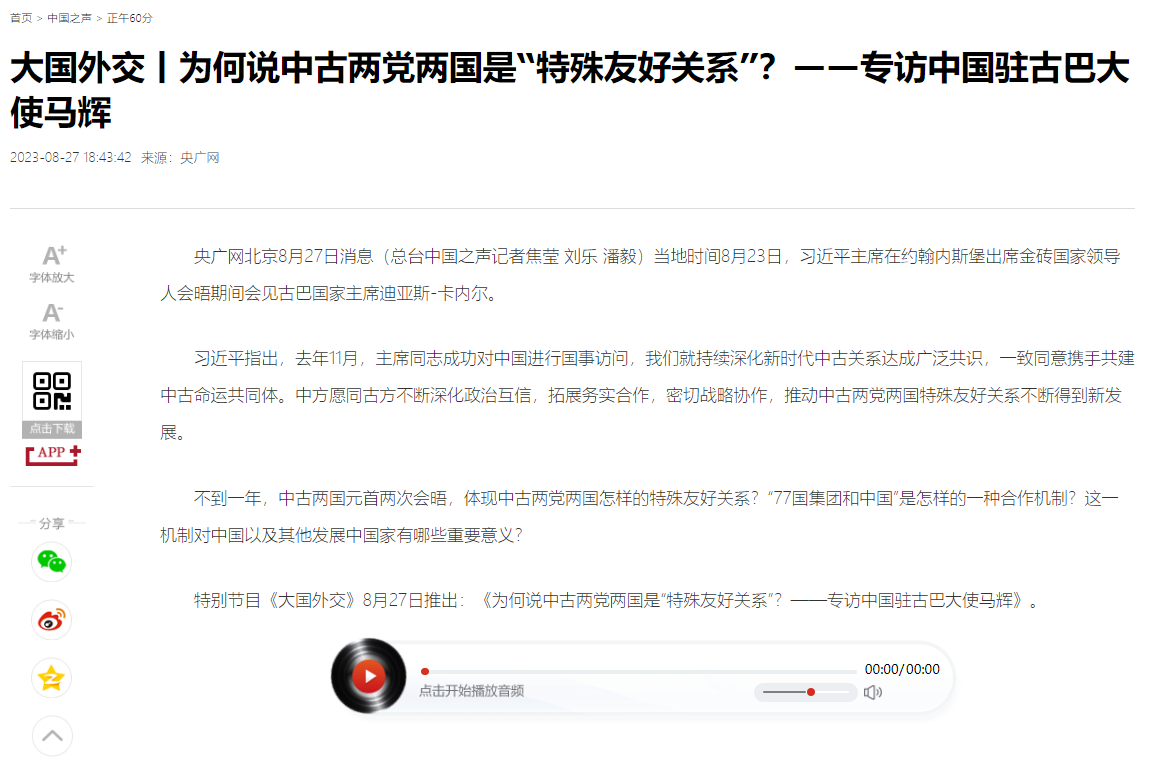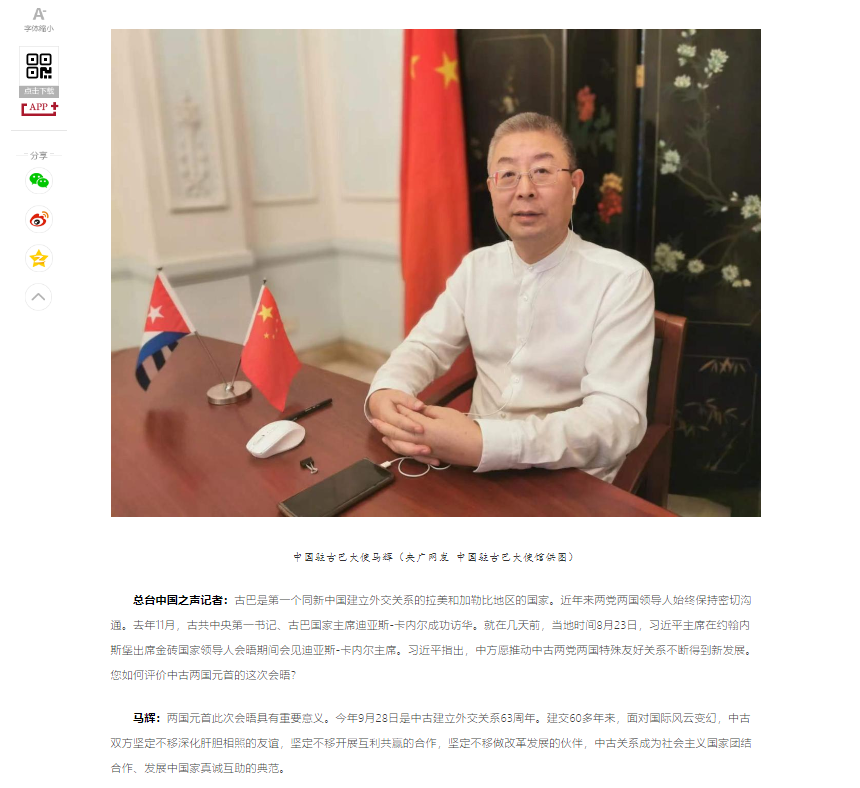

On August 26, 2023, Ambassador Ma Hui gave an exclusive interview to China Media Group (CMG) China National Radio (CNR) Special Program “Diplomacy of Major Countries”. The transcript of the interview is as follows:
CNR Journalist: Cuba was the first country in Latin America and the Caribbean to establish diplomatic relations with New China. In recent years, leaders of the two parties and countries have always maintained close communication. Last November, First Secretary of the Central Committee of the Communist Party of Cuba (PCC) and President of Cuba Miguel Díaz-Canel paid a successful state visit to China. Just a few days ago, on August 23, President Xi Jinping met with President Díaz-Canel in Johannesburg on the sidelines of the 2023 BRICS Summit. Xi pointed out that China is ready to promote new development of its special friendly relationship with Cuba. What is your comment on this meeting between the heads of State of China and Cuba?
Ma Hui: This meeting is of great significance. September 28 this year marks the 63rd anniversary of the establishment of diplomatic relations between China and Cuba. Over the past 60 years, despite the constantly changing international situation, China and Cuba have remained steadfast in deepening their friendship featuring sincerity and trust, in pursuing mutually beneficial and win-win cooperation, and in working together as partners in the cause of reform and development, making China-Cuba relationship a model of solidarity and cooperation among socialist countries and of sincere and mutual assistance among developing countries.
Last November, President Díaz-Canel paid a successful state visit to China. The two Heads of State reached an important consensus on deepening China-Cuba relations in the new era and agreed to work together to build a China-Cuba community with a shared future. During his meeting with President Díaz-Canel in Johannesburg on August 23, President Xi Jinping said that China is ready to continue deepening political mutual trust, expanding practical cooperation, strengthening strategic coordination, and pushing for progress in the special friendly relationship between the two parties and the two countries
The fact that the two leaders have met twice from Beijing to Johannesburg in less than a year’s time fully reflects the special and friendly relations between the two parties and the two countries. The two heads of state have maintained close communication and strengthened their strategic leadership of China-Cuba relations, which has added impetus to the continued enhancement of cooperation between the two countries in various fields. Against the present international uncertainties, the meetings between the two leaders will also help safeguard the common interests and development rights of developing countries and promote international justice and equity.
CNR Journalist: As an important platform for solidarity and cooperation among emerging market countries and developing countries, the BRICS cooperation mechanism has become a positive, stable, and constructive force in international affairs. Recently, a number of countries have expressed their intention to join the mechanism. What is Cuba’s comment on the role played by the mechanism? Why are so many countries interested in joining the BRICS?
Ma Hui: Cuba attaches great importance to the important role played by the BRICS in promoting common development and world multipolarity, as well as the growing international influence of the BRICS, and expresses its willingness to establish even closer relations with the BRICS countries. President Diaz-Canel emphasized that BRICS cooperation offers options for building a fairer and more equitable international economic order. And the fact that more than 20 developing countries have applied to join the mechanism fully demonstrates that the mechanism has gained wide recognition and support with increasing influence and popularity.
To be specific, the BRICS cooperation mechanism is a new type of cooperation organization among developing countries led by emerging powers, which practices the BRICS spirit of openness, inclusiveness, and win-win cooperation. The BRICS countries have set up a cooperation framework under the three pillars of political and security, economic and financial, and cultural and people-to-people cooperation, and creatively put forward the “BRICS Plus” model of cooperation, which has yielded fruitful results. The New Development Bank of the BRICS, established in 2014, focuses on infrastructure construction and sustainable development projects, and divides the shareholding and voting rights equally among member countries, thus providing a new option for the governance model of multilateral development finance. The mechanism has transcended traditional bloc politics, becoming a model of peaceful coexistence and friendly cooperation among countries with different social systems and cultures and a constructive force in the practice of genuine multilateralism, the democratization of international relations, and the multi-polarization of the world. It is playing an increasingly important role in the process of promoting world economic growth and improving global governance.
The just-concluded BRICS Summit in South Africa invited six countries, including Saudi Arabia, to become full members of the BRICS, reflecting the determination of the BRICS countries to work in solidarity and cooperation with the developing countries and meeting the common interests of the emerging market countries and the developing countries. It will inject new vitality into the BRICS cooperation mechanism and further strengthen the forces for peace and development in the world.
CNR Journalist: “G-77 and China” Summit will take place next month in Havana, the capital of Cuba, and Cuba has assumed the Pro Tempore Presidency of the Group for this year. What kind of cooperation mechanism is the G-77 and China? What is the significance of this mechanism for China and other developing countries? What preparations have been made by Cuba for this Summit?
Ma Hui: The Group of 77, established in 1964, is the world’s largest group of developing countries dedicated to strengthening solidarity and cooperation among developing countries in international economic affairs, promoting the establishment of a new international economic order, accelerating the process of economic and social development in developing countries, and promoting South-South cooperation. China has consistently supported the Group’s just ideas and reasonable demands and has maintained a good cooperative relationship with the Group. In 1991, at the preparatory meeting for the United Nations Conference on Environment and Development, China and the Group for the first time jointly put forward a position paper in the form of “The Group of 77 and China”.
The Group of 77 and China brings together 134 member countries, accounting for more than 85 percent of the global population. Within the framework of this mechanism, China and other developing countries have been working together through thick and thin to deepen South-South cooperation, defend the common interests of developing countries, promote economic and social development in developing countries, and safeguard international justice and equity.
As the largest developing country, China will always be a sincere friend and reliable partner of the vast number of developing countries and will play a greater role in implementing the United Nations 2030 Agenda for Sustainable Development and the rejuvenation of developing countries.
Cuba assumed the Pro Tempore Presidency of the Group of 77 and China in January this year and has done a great deal of work on sustainable development, development financing, and preparations for the Future Summit of the United Nations in 2024, thus making a positive contribution to strengthening the solidarity of developing countries. Cuba will host the G-77 and China Summit in September and has already made elaborate arrangements in terms of themes, documents, and logistical support. China attaches great importance to and supports Cuba’s hosting of the Summit. I am confident that the Summit will make a positive contribution to strengthening solidarity and cooperation among developing countries and to jointly addressing global challenges.
CNR Journalist: Latin America is a natural extension of the 21st Century Maritime Silk Road, and countries in the region are actively participating in the cooperation of building the Belt and Road Initiative. In May last year, China provided assistance to Cuba in dealing with climate change, including household solar photovoltaic power generation systems and energy-saving lamps and other materials, which helped Cuba to solve part of the basic electricity and lighting needs of rural residents in remote areas and improve their quality of life and sense of well-being. Ambassador Ma, how have the achievements of the “Belt and Road Initiative” jointly constructed by China and Cuba contributed to Cuba’s local economic and social development?
Ma Hui: This year marks the tenth anniversary of the Belt and Road Initiative (BRI) proposed by President Xi Jinping. At present, 22 Latin American countries have joined the Initiative. China and Cuba signed a BRI memorandum of understanding in 2018 and a cooperation plan in 2021. The project you just mentioned is about providing household solar photovoltaic power generation systems and lamps to Cuba under the framework of South-South cooperation in addressing climate change by the Chinese government in May last year. The power generation system and lamps cover the remote rural households in many provinces of Cuba, generating about 2,000 megawatt-hours of electricity per year and reducing carbon dioxide emissions by 1,600 tons, which not only helps to improve the livelihood of the people in remote areas of Cuba, but also helps to advance the transformation of Cuba’s energy structure. This is a vivid example of the Belt and Road Initiative in promoting the development of the local economy and people’s livelihood.
The joint construction of the Belt and Road initiative between China and Cuba has yielded successful results in the fields of agriculture, education, biotechnology, and renewable energy. Last year, the Cuban National Pavilion of High-Quality Products was opened in Jingdong, one of China’s largest e-commerce platforms, and Cuban honey, rum, guava paste, and other specialty products have successfully entered the Chinese market.
In terms of education, Cuba was one of the first countries to accept Chinese students of Spanish language learning and has trained thousands of Spanish-speaking talents for China. Last year, the China-Cuba Cooperation in Chinese Language Teaching Program made its way into Cuban secondary school classrooms for the first time. This year, the Higher Institute of International Relations, the cradle of Cuban diplomats, is offering Chinese courses.
Biotechnology cooperation is a highlight of bilateral cooperation, and Cuban monoclonal antibodies, interferon, and other flagship products have been launched or registered in China one after another. In the energy sector, the two countries have set up joint ventures for photovoltaic power generation, and have also turned waste into treasure, using bagasse and marabou, a destructive local plant, as fuel to generate electricity.
China will continue to strengthen cooperation with Cuba in such areas as biotechnology, renewable energy, public health, tourism, economic and trade, transportation, and communications, so as to better develop the economy and people’s livelihoods of Cuba for the benefit of the two countries and peoples.